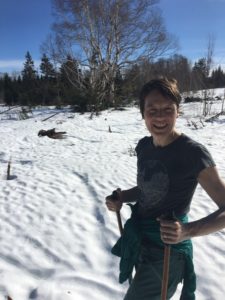This article, written by StFXAUT Communications Officer Philip Girvan, appeared in the Winter 2018 edition of The Beacon.
Shortly after completing PhD studies at York University, Dr. Riley Chisholm joined StFX University’s Department of Sociology. A desire to be in a coastal, rural setting was part of what prompted Dr. Chisholm to seek a position at StFX. Upon arriving in Antigonish for a job interview, Dr. Chisholm said that, “I immediately fell in love with it. I loved my job interview if that’s possible for me to say that. I have always been drawn to coastal communities”.
StFX has been a positive experience professionally. Chisholm emphasized that, “I have been surrounded by people whom I’ve come to admire and respect for many, many reasons. I have been encouraged here. The department itself, I would like to suggest, is among the most friendly and supportive that I’ve ever encountered”.
Chisholm told The Beacon that shortly after arriving in Antigonish in 2008, “I began raising goats and sheep, chickens and wanted really to pursue an understanding of so many of the people that live here. How they gathered their enthusiasm for farming and food production”. Chisholm described Antigonish as, “such a bright light: if you look across Canada where things are happening, rural communities are not necessarily as vibrant as Antigonish is as far as the local food movement and people working in the area of the environment and climate”.
Chisholm admitted being “very much prone to doing research which reflects where I am”. Research at York involved “looking at the sociology of fear. Doing stuff on panic disorder and gender”. Antigonish has provided Chisholm with “a real wonderful combination of ingredients that makes this just the right way for me to head with my research. I think the last decade here has been quite remarkable with the number of groups and organizations that emerged”.
Chisholm emphasized that “the University’s been actually quite wonderful in terms of, I’m going to say the Coady Institute has done an exceptional job of bringing people [together] who understand this problem, this fundamental problem of democracy”. Chisholm cited the visit by Dr. Vandana Shiva as an example of this commitment to creating a space where conversations around food, farming, and democratic participation can take place.
Despite the positive aspects of this foray into farming and getting to know local farmers, Chisholm also recognized that “how we think of food, how we conceive of food, how we disburse food and grow it has been turned into this violent interaction with the earth, with the planet”. As a result, “farming is an entryway into thinking about race, colonialism, gender”. Chisholm suggested that industrial farming is “very much patriarchal. It proposes a kind of attraction to big tractors and fertilizers. We can think about farming and agriculture as through a gendered lens. [Though] we don’t often think of farming as a relationship with a mother, but certainly it is. You plant the seed. You need to nurture it and it will grow”.
These considerations led to the creation of a course called SOCI 398 ST: Sociology of Agriculture and Sustainability. The StFX Sociology Department course description reads:
This course begins with an interdisciplinary survey of the scientific, philosophical, political, social and cultural aspects of global agriculture and food production. Topics examined include the green revolution, the relationship between agricultural and social sustainability, local food versus export economies, food security, food sovereignty and justice, as well as biotechnology, soil science and climate farming. We will also explore the nature and composition of food, techniques and concepts of food science, practices used in food processing, and issues related to food safety. Farm visits are included.
Chisholm noted that the course is designed to “use the local and its particularities. One of the major projects is doing interviews with farmers and making a documentary in which they are going to be able to utilize various farming instances in the local area to highlight global patterns”. Farm visits situate local practices within a global context. Food insecurity, succession planning, and the impacts of the agricultural-industrial complex are issues affecting local farmers as well as those around the world, and the course is an opportunity for students to “understand, for instance, that this is a dairy community and understand some of the obstacles to farming here. So we talk to farmers on their farms and say why are you, you know, doing this? Or why are you shutting things down?”.
In addition to visiting area farms, the course involves, as Chisholm described it, “getting students into the grocery store” and asking “why is there corn in just about everything that is available?”.
This leads to a better understanding of how “some of the policy-based and government endorsed and industry backed obstacles to local food security” and then connecting this to global occurrences. Chisholm mentions, “looking [at] Catalan and why are 2000 tractors filling the streets of Barcelona. Why is this politicization around food happening at this time and place, around the world?”.
“Part of my teaching and part of my research is working to grow communities that work together. They understand their interrelationship, their interdependence”.
Dr. Riley Chisholm is a Board Member of the Antigonish Community Food Bank. Chisholm is also among the rather sizeable and motivated group of Antigonish educators, parents, children and environmentalists who have embarked on creating the first local community supported forest school (K- Grade 8), called the Acadian Forest and Farm School.
More information about this model can be gathered from The Child and Nature Alliance, and if people are interested in the local school or our society, they can contact Riley directly at [email protected].

